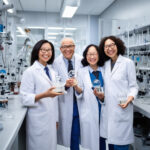In recent years, Los Angeles has found its place as a burgeoning hub for entrepreneurship in the fashion industry. The city’s unique blend of garment manufacturing and its status as the epicenter of entertainment has made it an appealing location for new and established fashion brands alike. This fusion of capabilities attracts a new generation of designers and entrepreneurs who seek to capitalize on the region’s resources and cultural allure.
One such entrepreneur is Alyssa Wasko, founder of the fashion label Donni. Wasko, who initially started her career in the bustling environment of New York, realized that in her quest for a manufacturer, Los Angeles offered a better fit for her operational needs. “I was going back upwards two times a month to a point where it was just not sustainable,” Wasko stated. Her story reflects a broader trend among fashion entrepreneurs who cite LA’s production capabilities as a significant factor in their decision to relocate. The city’s garment factories employ around 45,000 workers, surpassing any other U.S. city, which provides both a skilled labor pool and convenient access to manufacturing partners.
The rise of fashion brands in Los Angeles is evident not only in new companies like Wasko’s Donni but also in the successful expansion of established labels. For instance, brands such as Reformation and Good American have not only set up shop in the city but have also used it as a launching pad to grow their national appeal. The evolution of brands such as Amiri and Fear of God signifies this trend, as they redefine contemporary streetwear while thriving under the LA sun.
Recent entrants into the market, like PerfectWhiteTee, Jamie Haller, and Heaven Mayhem, are indicators of this new wave of entrepreneurial spirit in the city. The accessibility of resources and a supportive community fosters an environment where nascent brands can thrive. Jen Menchaca, the founder of PerfectWhiteTee, noted, “Everybody knows everybody, and it’s a very close community.” This interconnectedness serves as a substantial advantage for entrepreneurs looking to learn and grow rapidly within the local landscape.
Moreover, LA’s proximity to Hollywood significantly boosts the visibility of fashion brands. With celebrities frequently spotted wearing local designs or collaborating on collections, the city effectively amplifies organic brand growth. For example, Shea Marie, founder of swimwear label Same, leveraged her network in LA to garner early support from influential figures such as Kendall Jenner and Hailey Bieber, demonstrating how connections can propel a brand forward without heavy reliance on advertising budgets.
The cultural backdrop of Los Angeles plays a pivotal role in shaping the mindset of its business leaders. Many entrepreneurs are accustomed to a non-traditional work environment filled with creative challenges, paralleling the experience of starting a new business. As Jamie Haller, a local footwear designer, articulated, “It’s lots of people doing creative things. I hardly know anyone who has a normal corporate job.” This artistic atmosphere drives innovation and encourages experimentation, enabling founders to think outside the box and explore diverse marketing strategies.
When it comes to scaling a fashion endeavor, local manufacturing provides significant operational benefits. Los Angeles accounts for 83% of the nation’s cut-and-sew apparel sales, generating over $15 billion annually. This robust infrastructure allows brands to handle production more effectively, with many manufacturers accommodating smaller minimum order quantities compared to overseas facilities, key for emerging brands managing tight budgets. Jennifer Evans, founder of a local manufacturing company, elaborates on this ethos: “It makes more sense to launch where everything’s really tightly controlled.”
The ability to pivot quickly in response to customer feedback is another crucial advantage of local production. Influential brands can adapt their offerings in about six to eight weeks, a timeline vastly shorter than that of overseas alternatives. This rapid response capability enables LA brands to maintain their relevance in a fast-paced fashion landscape.
Nevertheless, the political landscape poses challenges. The potential for policy changes related to tariffs, immigration, and labor laws could impact the industry’s structure significantly. Entrepreneurs express concerns about losing access to the skilled immigrant workforce that has historically bolstered LA’s apparel sector. A shift in labor dynamics could alter the landscape that allows these fashion businesses to flourish.
In summary, Los Angeles has cultivated a thriving nexus for fashion entrepreneurship marked by an entrepreneurial spirit, a robust manufacturing sector, and the influence of celebrity culture. This environment not only rings in success for established brands but also opens doors for nascent designers. The strategic combination of these factors defines LA as a pivotal center for the evolution of the fashion industry.












